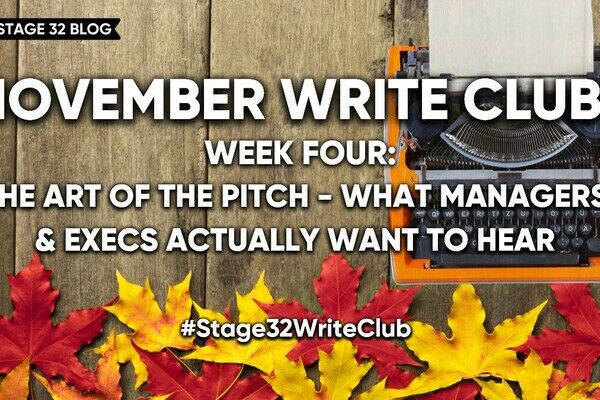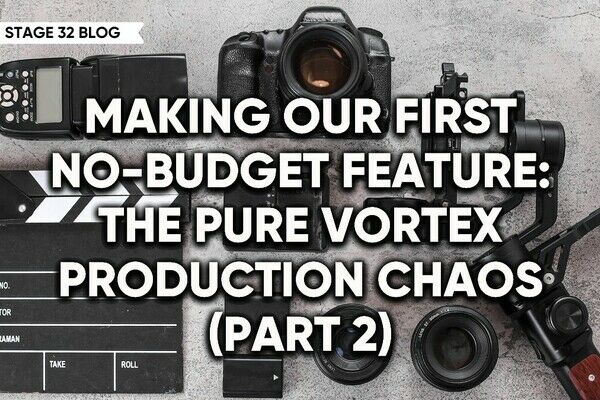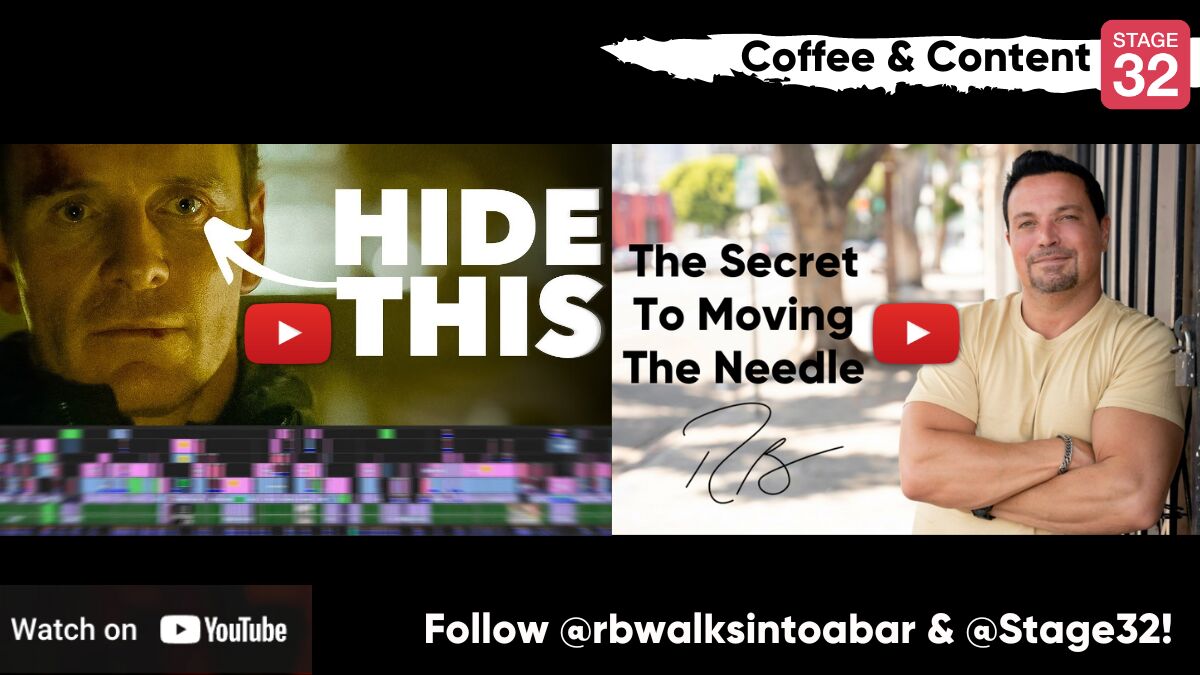July Filmmakers Club Week 5: Staying Motivated Against All Odds
When It All Slows Down, Don’t Give Up
Have you ever heard of The Three-Legged Stool? It sounds like a children’s fable, doesn’t it? It’s more like an industry fable, and it’s just as invaluable as The Deathly Hallows. In fact, many have attributed it to their longevity in the industry. Allow me to tell you the wisdom behind the notion, and make of it what you will...
It is said every professional creative should have three distinct ways to stay active in their career. The three legs are: what you want to do, what you can do now for money, and what you can do now for advancement. Consider acting as an example. What if what you want to do is perform a leading on-screen role but what you can do for money right now is motion capture work? Then consider using that extra money or time for classes that give you on-screen face time or making short films to showcase your main character's energy.
If you’re a multi-hyphenate, then make sure each category is as specific and on-track to deliver as possible. If what you want to do is Write/Direct a feature and what you can do now for money is voice-over work, then perhaps one way to move forward is to write/direct an animated short so you can use what you already have to advance your agenda.
Of course, there are lots of complications within each “leg”, but I can attest - there is always a way to keep going. I’ve been doing some version of theatre, film, television, and/or media for 30 years, and I’m just now producing my first feature (it’s actually a slate of five). I hope my years of slowing down and persevering can help you as you enter into your own time of uncertainty. Let’s unpack some of the external and internal delays most creatives face, and how you can navigate them to stay balanced on your Three-Legged Stool.

External Delays: Outside the Project
Income & Housing
Financial Wellness is essential to being a successful professional creative. That’s not to say you have to be wealthy or well-off. You do, however, have to be cautious if you want to weather every storm. The film, television, and media industry is constantly in flux, so sometimes you have to slow down to keep going. I was doing professional theatre straight out of high school, but balancing my first year of college with a full course load and two jobs, I burned out in one year. So, I became a massage therapist to be able to afford my life and return to school on my own terms, in my own time, and on my own dime. Sometimes I would get bored and help out with live events or concerts. Sometimes I would become inspired and host my own live events or participate in 48-Hour Film Projects. Finally, when I could afford it, I signed up for a couple of community college courses just to make sure I could still pass a class, and wouldn’t you know it - one of them was “The Art of Film”. The experience encouraged me to explore Colorado Film School when the time came to pursue my four-year degree, and thank goodness I did!
Whatever you are doing, whatever you are aiming for, it is not worth risking your life or livelihood. Make sure you provide for yourself and you will be able to show up and offer your best work. No one wants to hire out of pity. They want to hire the person who is going to help the project succeed. Show them that you already know how to show up for yourself.
Family Emergencies & Health Issues
Life does not wait for a project to end before it happens. Some of the hardest moments in one’s life are simply dealing with their unavoidable mortality. After my first year in film school, I found out that my father had passed away. That same semester I was taking a literature class, brilliantly taught mind you. Unfortunately, so many in-class discussions were triggering my grief that I ended up failing the class. But I had to let go of it in order to keep moving forward and graduate.
Similarly, in my senior year of college, at age 30, I discovered a major medical issue that required surgery, hospitalization, and a mound of medical payments that now added to my student debt. It took five years and tens of thousands of dollars (out-of-pocket) to resolve the immediate issue - and then I got my first staff position in television. The lesson I hope you take from this is - take care of yourself and anyone close to your heart first. Because if your heart's not in it, then you cannot fully show up.
It’s worth noting that in these situations, you can continue to gather inspiration, develop ideas, and even test it out through content creation or podcasting. What you cannot do is let those things be a priority. Use the more manageable steps within filmmaking to be your way back into the bigger commitments.

Mental & Spiritual Health
The delays associated with mental or spiritual health are less obvious than the physical ones, yet their symptoms are rather hard to ignore. Boredom, sluggishness, or unmotivated? On the flip side, maybe you’re experiencing irritability, excessive distraction, or acting differently towards loved ones? Before assuming these symptoms are character defects, consider first what might simply ail you. For mental sharpness, you may need to shake things up! Learn a new language, pick up a hobby, take a class in an unrelated subject, or perhaps take a vacation to experience a new culture! Breaking from the routine is an easy way to find your way back into filmmaking because if you still want to do it, your brain will find a way to relate what you’re doing to your next project.
Spiritual health is even more elusive, and often even more difficult to adjust course. If one’s spirit is not in harmony, it is often because one is not acting in accordance with their own values. How do you know what you value? Well, in character development terms, it would simply be “What does your character spend their time or money on?” So, ask yourself - if you had a month off, maybe even a full sabbatical (six months off), what would you do with your time? If you had a million dollars, no debt, and no need for any necessities, what would you do with the money? Now ask yourself, with those answers, what is preventing you from pursuing those “wants” now? Your spirit still wants those things and if you are not working together with it, then your divided spirit may pull you off course altogether. In these cases, I recommend that creatives reflect, but also develop a system to help them reflect. This could be a practice (religious or otherwise), a community, a counselor, or simply journaling to make sure they can still reference their thoughts and feelings.
Rejections & Social Complications
If developing relationships are integral to success in this industry, then managing - and possibly pruning - relationships is also key. Rejection doesn’t just come early in a relationship. It can also be for many reasons, not just personal ones - financial, physical, mental, emotional - pretty much every reason you may have to slow yourself down to keep going, someone else could also have for saying “no”. They, too, have to sustain themselves over the lulls.
As you continue to grow and shape your social circle, you may find yourself both catapulted forward and held back by certain people. While it may be enticing to simply cut out the people who seem to hold you back, for your own heart, I implore you to attempt to talk with them first. Even if the ultimate decision is to go your own separate ways, clarifying why will give you both closure. It will also help to determine if they are being let go from a project, or from your life. You’d be surprised how much collaborators appreciate clear, upfront communication and will ask you back even after current rejections.
Strikes, Weather, & Acts of God
What can you do? Nothing. Stay safe, take care of yourself and your loved ones, and wait it out. Well, for strikes, you can get involved, but there’s no telling when it will end. For my sanity, I like to think that delays caused by “acts of god” are signs that I need to take the break. Creativity is born from limitations, so when inexplicably delayed, allow yourself to explore. Ask yourself, “what else could I do right now to safely continue moving forward?”
As it turns out, this is an incredibly advantageous ability to have when in full-on filmmaking mode! When on set, plenty of stuff does not go according to plan and you’ll need that ability to pivot. Use it in your low-energy mode filmmaking process, too!

Internal Delays: Within the Project
Funding & Resources
This is probably the easiest delay to address and yet the biggest concern for filmmakers. Allow me to double down on what I’m about to say, so feel free to print it out and hang it somewhere:
Lack of funding is not a reason to stop working.
One more time for the people in the back…
Lack of funding is not a reason to stop working.
This is in part because finding funding requires work, so doing nothing while waiting for financing will effectively halt the project’s momentum altogether. One of my favorite influencers D4Darius has a great video about this subject - but I’m going to let you find which one because one of the things you can do while things slow down is research. ENJOY!
Participation & Planning
Sometimes momentum slows down because the people on the project don’t participate. It’s like in grade school when you’re in a group project. Not everyone holds up their end, and while you can pick up the slack on a science fair project or history report, the shared responsibility of filmmaking is not one you can easily helm solo. When team participation slows down, instead of muscling through, consider planning work sessions. This is less about making a goal and working towards that goal, and more about setting the intention of strengthening your team.
Our proof-of-concept short film “Sanctuary”, which is just now on the film festival circuit, started in February 2020. That project survived a pandemic, several strikes, and multiple delays, and I sincerely believe it’s due to one essential plan: we meet at the same time every week, like we’re a big production company, regardless of whether or not we have an agenda or not. It was a plan that allowed us to plan, and the plan to plan kept us going.
While it’s easy to assume that planning the logistics of a shoot or a film festival strategy seems like the only way to be productive, planning to encourage participation is more indirect. It’s less about managing people and more about acknowledging what people need. As a wise manager once told me, “Make it fun, and people will show up for the party and stay for the clean-up”.

Decision-Making
Interestingly enough, having regular meetings also made making decisions far easier. When you continue to make small decisions over a long period of time, you find the big decision, when it comes, doesn’t feel so different. It’s a bit like learning to run a marathon by walking a 5k. It might not be nearly enough, but it’s a starting point so your body doesn’t go into shock.
In contrast, if you sit idle, afraid to make any decisions, then you run the risk of never doing anything you enjoy just because you can’t do the thing you want most right now. Find a way to make the best decision with what you have right now and it will allow you to make the next best decision, and so on. That ability to compromise will come in handy when the tide changes and things pick up speed. My current mantra is “I am grateful for the problems I have” because the decisions don’t get easier as you have more time, money, or resources. You get better at making decisions because you’ve been making them all along.
Closure
When all else fails, revisit past projects. Perhaps you can clean up a drive and create more space. Perhaps you can re-edit your reel or create behind-the-scenes shorts or photo essays. You can even reach out to old contacts to let them know you’re thinking about them or see if there is a way you can help them on their journey. By revisiting old projects and reconnecting with previous collaborators, you essentially give yourself a barometer to test if it is closed or still open.
Be gentle with this stage and yourself, however. You may learn certain things you were hoping were still open are actually quite unavailable. You may even learn that you contributed to their end, but take note, have a drink, lick your wounds, and resolve to do better. Heck, make a plan to do better. But remember that the purpose of looking back is so you can move forward with confidence. The purpose of slowing down is so you can continue to move forward.
And then, when you’re ready… find your tribe and make a weekly meeting with them. You can do both of these things right here on Stage 32! It really makes a difference.

Your Final July Filmmakers Club Challenges!
As we wrap up this incredible month of events, we hope that you'll take what you learned and keep going. Keep pushing yourselves to learn, grow, and connect with other creatives around the world who can offer you support, mentorship, wisdom, and encouragement when you need it the most. Below are your final challenges for this week and every week following should you choose to keep pushing yourself toward your goals. Just remember that the Stage 32 Team and Community are going to continue to be here as a resource for you, every step of the way.
1. Comment on at least 2 Lounge Posts every day! Share words of encouragement, answers to other member's questions, or links to resources when you have them. Support one another and contribute to conversations. Be seen by others in the community! 2 comments a day is such an easy way to engage.
2. Post in at least 2 Stage 32 Lounges every week! Ask questions when you have them. Share stories of your experiences, what you're learning, your victories, and your setbacks. Provide tips and tricks to your fellow creators. Post video tutorial links and trade articles. Start a conversation about something you want to geek out on. It's even easier if you have the Free Stage 32 App, which you can download HERE.
3. Send at least 3 network requests every week! Continue meaningful conversations with people that you're meeting in the lounges. Offer other members help, feedback, and support through private DMs. Do 3 nice things for a new contact before you ask for help in return.
4. Join in on weekly Ask Me Anything events in the lounges! These are FREE opportunities to connect with working industry professionals directly! To ask questions, and learn about various disciplines and processes, every Wednesday! If you don't join in and comment on the posts, you're missing out. These events are promoted weekly in the Stage 32 Lounges and @Stage32 on Instagram, X, Facebook, and LinkedIn.
All of these are easy, FREE, virtual ways to set yourself up for success toward your goals every single day. All you have to do is keep going. Keep posting. Keep trying. Stay motivated against all odds.
Let's hear your thoughts in the comments below!
Got an idea for a post? Or have you collaborated with Stage 32 members to create a project? We'd love to hear about it. Email Ashley at blog@stage32.com and let's get your post published!
Please help support your fellow Stage 32ers by sharing this on social. Check out the social media buttons at the top to share on Instagram @stage32 Twitter @stage32 Facebook @stage32 and LinkedIn @stage-32
| 15 Powerful Tips to Embrace Abundance in Your Creative Journey |
| Coffee & Content: The Secret To Moving The Needle |
Search Stage 32 Blog
There are now 4044 blog posts for you to enjoy. Search them all by tags below.
Acting, Advice, Cinematography, Coffee & Content, Composing, Contests, Distribution, Featured, Filmmaking, Financing, Inspirational, Networking, Producing, Screenwriting, Success Stories, Tips, Trending,Relevant Tags
Recommended Articles

November Write Club Week 4: The Art of the Pitch- What Managers & Execs Actually Want to Hear

Want Success in the Entertainment Industry? Start Writing Your Own Narrative

Coffee & Content: Why Your Next Step Matters More Than the Perfect Step

What Stage 32's Community Is Really About (Beyond Scripts, Sets, and Showreels)

Making Our First No-Budget Feature: The Pure Vortex Production Chaos (Part 2)

7 Life Hacks For Creatives

Forbes Spotlights Stage 32 Certification!

Find Your Footing on Stage 32: Join Our December Community Open House

Stage 32 Certification Featured In IndieWire!






